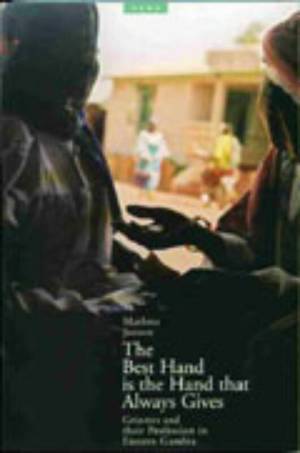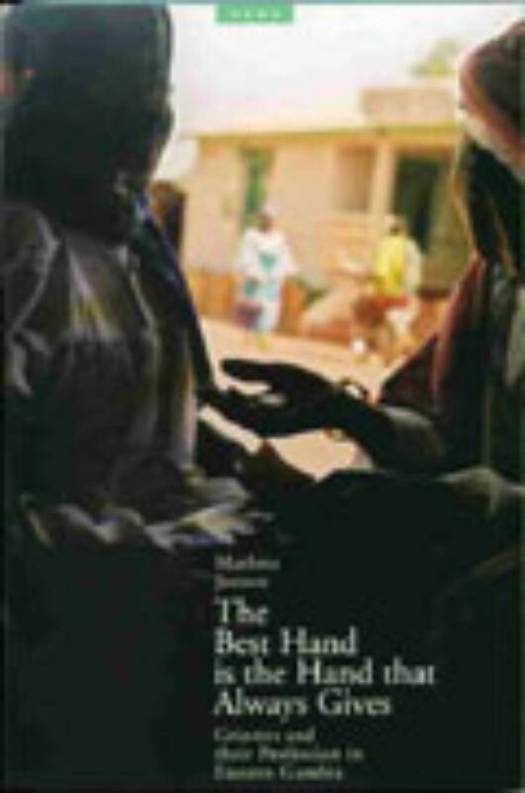
Door een staking bij bpost kan je online bestelling op dit moment iets langer onderweg zijn dan voorzien. Dringend iets nodig? Onze winkels ontvangen jou met open armen!
- Afhalen na 1 uur in een winkel met voorraad
- Gratis thuislevering in België vanaf € 30
- Ruim aanbod met 7 miljoen producten
Door een staking bij bpost kan je online bestelling op dit moment iets langer onderweg zijn dan voorzien. Dringend iets nodig? Onze winkels ontvangen jou met open armen!
- Afhalen na 1 uur in een winkel met voorraad
- Gratis thuislevering in België vanaf € 30
- Ruim aanbod met 7 miljoen producten
Zoeken
The best hand is the hand that always gives
griotes and their profession in Eastern Gambia
Marloes Janson
€ 50,00
+ 100 punten
Omschrijving
Griottes (female bards) are a striking feature of Mandinka culture. They can be recognized by their flamboyant style of dressing and their sharp voices. Nevertheless, griottes have largely been neglected in scientific literature, while ample attention has been paid to griots (male bards). This book tries to fill the gap.
Marloes Janson lived with the griottes from a Mandinka community in eastern Gambia for more than a year and was trained by them as an apprentice. From this perspective she describes the daily life and concerns of the griottes, their skills, their techniques for learning the profession, their means of subsistence, their relationships with the griots and their patrons.
The main activity of griottes is daaniroo. When they set out for daaniroo, they praise their patrons, and in return they are rewarded with money or goods. This book shows that daaniroo is a highly controversial practice. It is sometimes considered a new development, while at the same time it fits in with the bardic tradition. Some patrons disapprove of daaniroo, yet they are dependent on it to have their prestige confirmed. Several Koranic scholars regard daaniroo as conflicting with Islam, while the griottes do their best to embed their activities in an Islamic discourse. By studying the gendered practice of daaniroo, the dynamics of female 'griotism' are demonstrated.
In English, 322 pp. incl. bibl.& index)
'A very fine achievement that gives scholars of Africa, performance, and gender much richness to build on.' - Caroline Bledsoe in: The Journal of the Royal Anthropological Institute, Vol. 11, no. 4, Dec. 2005, pp.874-875.
Marloes Janson lived with the griottes from a Mandinka community in eastern Gambia for more than a year and was trained by them as an apprentice. From this perspective she describes the daily life and concerns of the griottes, their skills, their techniques for learning the profession, their means of subsistence, their relationships with the griots and their patrons.
The main activity of griottes is daaniroo. When they set out for daaniroo, they praise their patrons, and in return they are rewarded with money or goods. This book shows that daaniroo is a highly controversial practice. It is sometimes considered a new development, while at the same time it fits in with the bardic tradition. Some patrons disapprove of daaniroo, yet they are dependent on it to have their prestige confirmed. Several Koranic scholars regard daaniroo as conflicting with Islam, while the griottes do their best to embed their activities in an Islamic discourse. By studying the gendered practice of daaniroo, the dynamics of female 'griotism' are demonstrated.
In English, 322 pp. incl. bibl.& index)
'A very fine achievement that gives scholars of Africa, performance, and gender much richness to build on.' - Caroline Bledsoe in: The Journal of the Royal Anthropological Institute, Vol. 11, no. 4, Dec. 2005, pp.874-875.
Specificaties
Betrokkenen
- Auteur(s):
- Uitgeverij:
Inhoud
- Aantal bladzijden:
- 321
- Taal:
- Engels
- Reeks:
- Reeksnummer:
- nr. 118
Eigenschappen
- Productcode (EAN):
- 9789057890802
- Verschijningsdatum:
- 1/07/2002
- Uitvoering:
- Hardcover
- Afmetingen:
- 161 mm x 238 mm
- Gewicht:
- 602 g

Alleen bij Standaard Boekhandel
+ 100 punten op je klantenkaart van Standaard Boekhandel
Beoordelingen
We publiceren alleen reviews die voldoen aan de voorwaarden voor reviews. Bekijk onze voorwaarden voor reviews.











